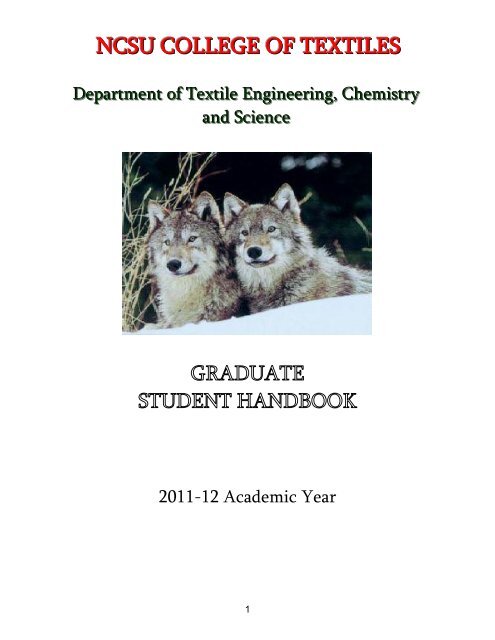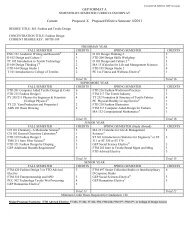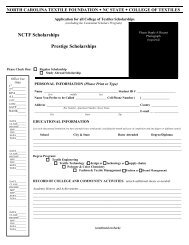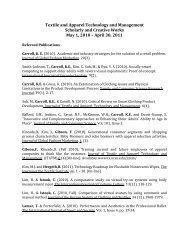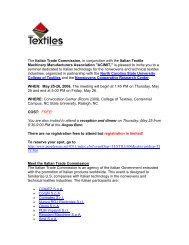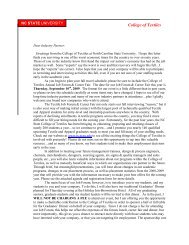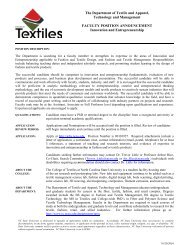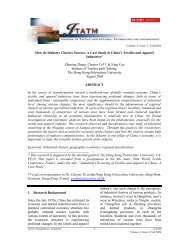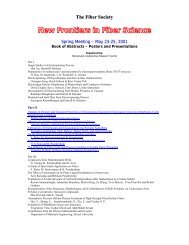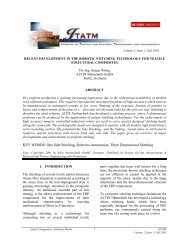TECS Graduate Handbook - College of Textiles
TECS Graduate Handbook - College of Textiles
TECS Graduate Handbook - College of Textiles
You also want an ePaper? Increase the reach of your titles
YUMPU automatically turns print PDFs into web optimized ePapers that Google loves.
NCSU COLLEGE OF TEXTILES<br />
Department <strong>of</strong> Textile Engineering,, Chemistry<br />
and Science<br />
2011-12 Academic Year<br />
1
I. PRIOR TO STARTING YOUR DEGREE PROGRAM<br />
A. Residency<br />
If you are not a North Carolina resident and you are a US citizen, you need to take steps to<br />
establish North Carolina residency as soon as you arrive. This will facilitate your eligibility<br />
for in-state tuition and fee rates after your first year. For more details, please visit the<br />
following URL: http://www2.acs.ncsu.edu/grad/students/current/resident.htm.<br />
B. Unity Accounts<br />
E-mail accounts -- called Unity Accounts -- for new students are automatically generated<br />
after admission has been granted. The Unity account allows students to access the campus<br />
computing resources, register with SIS online, and access and maintain student<br />
information. Students' user IDs are based on first and middle initials and up to the first six<br />
letters <strong>of</strong> the last name. The initial password for student user IDs is set to the students’<br />
social security number.<br />
C. Registering for Classes<br />
An advising hold is placed on students’ records at the beginning <strong>of</strong> each semester<br />
preventing a student from registering. If a student has already been assigned an Advisor,<br />
the student will need to contact his/her Advisor to release the HOLD on your account..<br />
New students should contact the Director <strong>of</strong> <strong>Graduate</strong> Programs to discuss selecting<br />
courses for the first semester, and also releasing HOLD on your account. .<br />
D. All-Campus Card<br />
Students are required to have an All-Campus Card. The card serves as a student<br />
identification card and gives access to multiple services, including D.H. Hill Library, Student<br />
Health Services, Carmichael Gymnasium, and special events. When money is deposited on<br />
the All-Campus Card, it serves as both a debit card and as a library copy card. The All-<br />
Campus Card <strong>of</strong>fice is located in the West Dunn Building. You must be registered for<br />
classes before an All-Campus Card will be issued.<br />
E. Parking Permit<br />
All vehicles parking on the NC State campus must be registered with Transportation. Valid<br />
permits are required for vehicles parked on campus between 7:00 a.m. and 5:00 p.m.,<br />
Monday through Friday. Permits are sold based on space availability and eligibility,<br />
however, graduate students are given preference on the waiting list. A parking permit may<br />
be requested when you register for courses via SIS, or with the Transportation Department<br />
located in The Administrative Services Center.<br />
F. Tuition and Fees<br />
You will receive an e-bill for your tuition and fees that is based on your initial course load.<br />
Tuition and fees are payable by the due date on your bill. The Cashier's Office provides you<br />
with several options to make your tuition payments -- check, on-line, or by credit card.<br />
Students receiving an assistantship should complete the online Notice <strong>of</strong> Sponsorship<br />
form found on the Cashier’s website by typing GSSP in the blank for Third Party<br />
Sponsor. From the drop down menu, select tuition only. Student pays student fees.<br />
2
II.<br />
PROGRAM STRUCTURE<br />
A. Master <strong>of</strong> Science in Textile Chemistry, Option A (Thesis) Degree<br />
1. A minimum <strong>of</strong> 30 credit hours is required to fulfill the degree requirements<br />
2. Students must take a minimum <strong>of</strong> 5 courses from the approved TC <strong>of</strong>ferings 1,2 :<br />
TC 502<br />
Textile Wet Processing<br />
TC 530<br />
The Chemistry <strong>of</strong> Textile Auxiliaries<br />
TC (MSE) 561 Organic Chemistry <strong>of</strong> Polymers<br />
TC 565<br />
Polymer Applications and Technology<br />
Polymeric Biomaterials Engineering<br />
TE 566(BME) Prereq: PY 208,(TE 200, or CH 220, or CH 221) and MAE<br />
206,or CE 214)<br />
TC(TE.TMS) 589 Special Studies in Textile Engineering Science<br />
TC 601<br />
Seminar<br />
TC 630<br />
Independent Study<br />
TC 685<br />
Master’s Supervised Teaching<br />
TC688<br />
Non-Thesis Master’s Continuous Registration- Half Time<br />
TC 689<br />
Non-Thesis Master’s Continuous Registration<br />
TC 690<br />
Master’s Examination<br />
TC 693<br />
Master’s Supervised Research<br />
TC 695<br />
Master’s Thesis Research<br />
TC 696<br />
Summer Thesis Research<br />
TC 699<br />
Master’s Thesis Preparation<br />
TC 704<br />
Fiber Formation—Theory and Practice<br />
TC 705<br />
Theory <strong>of</strong> Dyeing<br />
TC 706<br />
Color Science<br />
TC 707<br />
Color Laboratory<br />
TC 720<br />
Chemistry <strong>of</strong> Dyes and Color<br />
TC 721<br />
Dye Synthesis Laboratory<br />
TC (CH,MAT) 762 Physical Chemistry <strong>of</strong> High Polymer – Bulk Properties<br />
TC(CHE) 769 Polymer, Surfactants and Colloidal Materials<br />
TC 771<br />
Polymer Microstructures, Conformations and Properties<br />
TC(CH,MSE) 772 Physical Chemistry <strong>of</strong> High Polymers – Solution Properties<br />
TC(CHE) 779 Diffusion in Polymers<br />
TC 791<br />
Special Topics in Textile Science<br />
TC(TE,TMS) 792 Special Topics in Fiber Science<br />
TMS 500 Fiber and Polymer Microscopy<br />
TMS 763<br />
Characterization <strong>of</strong> Structure <strong>of</strong> Fiber Forming Polymers<br />
(Prereq: MA 301, PY 208)<br />
TE 589<br />
Special Topics (Electrospinning)<br />
1<br />
All are 3-credit hour courses<br />
2<br />
Substitutions must be approved by the Director <strong>of</strong> <strong>Graduate</strong> Programs,<br />
<strong>TECS</strong> Department<br />
In addition the program will review the syllabus fo the TMS 761 course to assess<br />
suitability for inclusion in the above list. The situation with<br />
TE (TMS) 565, the prerequisite has to be resolved before the course could be<br />
approved.<br />
3
3. Six hours <strong>of</strong> TC 695 (Thesis Research), which count toward the 30 credit hour<br />
minimum requirement.<br />
4. Two semesters <strong>of</strong> TC 601 (<strong>Graduate</strong> Seminar), which count toward the 30 credit<br />
hours minimum requirement.<br />
5. Up to three courses (9 credit hours) are to be chosen from supporting (minor)<br />
areas. The courses may be selected from a single field, e.g., chemistry, textile<br />
technology, or biomedical engineering; from two designated fields (co-minor); or<br />
from more than one discipline (interdisciplinary minor). No more than one <strong>of</strong><br />
these courses may be a 400-level course.<br />
4
B. Master <strong>of</strong> Science in Textile Engineering, Option A (Thesis) Degree<br />
1. A minimum <strong>of</strong> 30 credit hours is required to fulfill the degree requirements.<br />
2. Students must take a minimum <strong>of</strong> 5 courses from the approved TE <strong>of</strong>ferings 1,2 :<br />
TE 501<br />
Analysis and Design <strong>of</strong> Yarn Production Systems<br />
TE 502<br />
Dynamics <strong>of</strong> Fabric Production Systems<br />
TE 505<br />
Textile Systems and Control<br />
TE 533<br />
Lean Six Sigma Quality<br />
TE 540<br />
Textile Information Systems Design<br />
TE 565<br />
Textile Composities<br />
TE 566<br />
Polymeric Biomaterials Engineering<br />
TE 570<br />
Polymer Physics<br />
TE(TC) 589<br />
Special Studies in Textile Engineering and Science<br />
TE 601<br />
Seminar<br />
TE 602<br />
Textile Technology Seminar<br />
TE 630<br />
Independent Study<br />
TE 676<br />
Special Projects<br />
TE 685<br />
Master’s Supervised Teaching<br />
TE 690<br />
Master’s Examination<br />
TE 693<br />
Master’s Supervised Research<br />
TE 695<br />
Master’s Thesis Research<br />
TE 696<br />
Summer Thesis Research<br />
TE 699<br />
Master’s Thesis Preparation<br />
TE 705<br />
Textile Instrumentation and Control Systems<br />
TE(ECE,MAE,FPS) 717 Multivariable Linear Systems Theory<br />
TE(FPS,TT,) 781 Mechanics <strong>of</strong> Twisted Structure<br />
TE(FPS,TT) 781 Mechanics <strong>of</strong> Fabric Structure<br />
TMS 500<br />
Fiber and Polymer Microscopy<br />
TMS(FPS, MSE) 761 Mechanical and Rheological Properties <strong>of</strong> Fibrous Material<br />
TMS(FPS) 762<br />
Physical Properties <strong>of</strong> Fiber Forming Polymers, Fibers and<br />
Fibrous Structures<br />
TMS(FPS,MSE) 763 Characterizaton <strong>of</strong> Structure <strong>of</strong> Fiber Forming Polymers<br />
TT 504<br />
Introduction <strong>of</strong> Nonwovens<br />
TT 505<br />
Advanced Nonwovens Processing<br />
TT 506<br />
Bonding Principles in Nonwovens<br />
TT 507<br />
Nonwoven Characterization Methods<br />
TT 508<br />
Nonwoven Product Development<br />
TT 532<br />
Evaluation <strong>of</strong> Biotextiles<br />
TT 581<br />
Technical <strong>Textiles</strong><br />
5
Note: Will allow 1 substitution from Textile Chemistry course list below; or 2<br />
2 from list with TE Program Director approval<br />
Organic Chemistry <strong>of</strong> Polymers<br />
TC(MSE) 561 (Prereqs: PCC 461 (Chemistry <strong>of</strong> Polymeric Materials)<br />
CH 231, or CH 431)<br />
Polymer Applications and Technology<br />
TC 565<br />
(Preqs: 1-year <strong>of</strong> Organic Chemistry; PCC 461)<br />
TC 704<br />
Fiber Formation—Theory and Practice<br />
Theory <strong>of</strong> Dyeing (name subject to change: adsorption,<br />
diffusion into porous media and thermo/kinetics <strong>of</strong><br />
TC 705<br />
reactions, isotherms)<br />
(Prereq: CH 433).<br />
Color Science and TC 707 Color Science Lab<br />
TC 706<br />
(Co-Req: TC 707)<br />
Polymers, Surfactants and Colloidal Materials<br />
TC (CHE) 769`<br />
(Prereqs: CHE 316, CH 223<br />
Polymer Microstructures, Conformations and Units<br />
TC 771<br />
Properties (Prereq: CHE 220)<br />
Diffusion Polymers<br />
TC (CHE) 779<br />
(Prereq: CHE 769)<br />
1<br />
All are 3-credit hour courses<br />
2<br />
Substitutions must be approved by the Director <strong>of</strong> <strong>Graduate</strong> Programs,<br />
<strong>TECS</strong> Department.<br />
3. Six hours <strong>of</strong> TE 695 (Thesis Research), which count toward the 30 credit hour<br />
minimum requirement.<br />
4. Two semesters <strong>of</strong> TE 601 (<strong>Graduate</strong> Seminar), which count toward the 30 credit<br />
hours minimum requirement.<br />
5. Up to three courses (9 credit hours) are to be chosen from supporting (minor)<br />
areas. The courses may be selected from a single field, e.g., textile technology,<br />
statistics, or industrial engineering; from two designated fields (co-minor); or from<br />
more than one discipline (interdisciplinary minor). No more than one <strong>of</strong> these<br />
courses may be a 400-level course.<br />
6
C. M.S. Option B (Non-Thesis) Degrees Overview<br />
The Textile Engineering, Chemistry and Science Department oversees two M.S. Option<br />
B programs, granting an M.S. degree to students who fulfill the 33-hour course work<br />
requirements in textile chemistry or the 30-hour course work requirements in textile<br />
engineering, and who pass the department’s final oral examination. Students enrolled<br />
in this program option will develop a Plan <strong>of</strong> <strong>Graduate</strong> Work under the direction <strong>of</strong><br />
his/her faculty advisor.<br />
Generally, research and thesis preparation courses (TC/TE 695, 699), which may be<br />
used in the M.S. Option a (thesis-based) track, may not be used to fulfill the course<br />
work requirements for the M.S. Option B degree. An exception is made for M.S.<br />
students on the way to a Ph.D. degree. These individuals may count 6 hours <strong>of</strong> thesis<br />
research toward their degree.<br />
A student who passes the Final Oral Examination will be eligible for an M.S. Option B<br />
degree in the semester in which the examination is administered or in the semester in<br />
which the M.S. course work is completed, whichever comes last.<br />
To obtain an M.S. degree under Option B, a student must complete 2 semesters (6<br />
credit hours) <strong>of</strong> TE 630 to the satisfaction <strong>of</strong> the student’s program advisor. The results<br />
<strong>of</strong> this course work will serve as the basis for the final oral examination and must be<br />
presented no later than two weeks prior to the deadline for submission <strong>of</strong> degrees for<br />
the semester in which the degree is to be awarded. Under normal circumstances,<br />
fulfillment <strong>of</strong> the final examination requirement is expected to be in the province <strong>of</strong> the<br />
student’s advisor in co-operation with the Director <strong>of</strong> <strong>Graduate</strong> Programs. However, the<br />
student’s advisor may elect to form an examination/advisory committee that would<br />
include a minor representative and/or a third <strong>TECS</strong> faculty member.<br />
On-campus students may enroll in this program only if they are Ph.D. students who are<br />
required to earn a master’s degree on the way to the doctoral degree.<br />
Students in the Option B programs are not eligible for assistantships.<br />
7
D. M.S. in Textile Chemistry, Option B (Non-Thesis) Degree<br />
1. A minimum <strong>of</strong> 33 credit hours is required to fulfill the degree requirements<br />
2. Students must take a minimum <strong>of</strong> 6 courses from the approved TC <strong>of</strong>ferings 1,2 :<br />
TC 502<br />
Textile Wet Processing<br />
TC 530<br />
The Chemistry <strong>of</strong> Textile Auxiliaries<br />
TC (MSE) 561 Organic Chemistry <strong>of</strong> Polymers<br />
TC 565<br />
Polymer Applications and Technology<br />
Polymeric Biomaterials Engineering<br />
TE 566(BME) Prereq: PY 208,(TE 200, or CH 220, or CH 221) and MAE<br />
206,or CE 214)<br />
TC(TE.TMS) 589 Special Studies in Textile Engineering Science<br />
TC 601<br />
Seminar<br />
TC 630<br />
Independent Study<br />
TC 685<br />
Master’s Supervised Teaching<br />
TC688<br />
Non-Thesis Master’s Continuous Registration- Half Time<br />
TC 689<br />
Non-Thesis Master’s Continuous Registration<br />
TC 690<br />
Master’s Examination<br />
TC 693<br />
Master’s Supervised Research<br />
TC 695<br />
Master’s Thesis Research<br />
TC 696<br />
Summer Thesis Research<br />
TC 699<br />
Master’s Thesis Preparation<br />
TC 704<br />
Fiber Formation—Theory and Practice<br />
TC 705<br />
Theory <strong>of</strong> Dyeing<br />
TC 706<br />
Color Science<br />
TC 707<br />
Color Laboratory<br />
TC 720<br />
Chemistry <strong>of</strong> Dyes and Color<br />
TC 721<br />
Dye Synthesis Laboratory<br />
TC (CH,MAT) 762 Physical Chemistry <strong>of</strong> High Polymer – Bulk Properties<br />
TC(CHE) 769 Polymer, Surfactants and Colloidal Materials<br />
TC 771<br />
Polymer Microstructures, Conformations and Properties<br />
TC(CH,MSE) 772 Physical Chemistry <strong>of</strong> High Polymers – Solution Properties<br />
TC(CHE) 779 Diffusion in Polymers<br />
TC 791<br />
Special Topics in Textile Science<br />
TC(TE,TMS) 792 Special Topics in Fiber Science<br />
TMS 500 Fiber and Polymer Microscopy<br />
TMS 763<br />
Characterization <strong>of</strong> Structure <strong>of</strong> Fiber Forming Polymers<br />
(Prereq: MA 301, PY 208)<br />
TE 589<br />
Special Topics (Electrospinning)<br />
1<br />
All are 3-credit hour courses<br />
2<br />
Substitutions must be approved by the Director <strong>of</strong> <strong>Graduate</strong> Programs,<br />
<strong>TECS</strong> Department.<br />
3. Off-campus (distance education) students must complete 6 hours <strong>of</strong> TC 630<br />
(Independent Study). Students pursuing the M.S. on the way to the Ph.D. may<br />
8
substitute 695 or 895 credits.<br />
4. Two semesters <strong>of</strong> TC 601 (<strong>Graduate</strong> Seminar), which count toward the 30 credit<br />
hours minimum requirement, are only expected <strong>of</strong> on-campus students.<br />
5. Up to three courses (9 credit hours) are to be chosen from supporting (minor)<br />
areas. The courses may be selected from a single field, e.g., chemistry, textile<br />
technology, or biomedical engineering; from two designated fields (co-minor); or<br />
from more than one discipline (interdisciplinary minor). No more than one <strong>of</strong><br />
these courses may be a 400-level course.<br />
9
E. M.S. in Textile Engineering, Option B (Non-Thesis) Degree<br />
1. A minimum <strong>of</strong> 30 credit hours is required to fulfill the degree requirements.<br />
2. Students must take a minimum <strong>of</strong> 5 courses from the approved TE <strong>of</strong>ferings 1, 2,3 :<br />
TE 501<br />
Analysis and Design <strong>of</strong> Yarn Production Systems<br />
TE 502<br />
Dynamics <strong>of</strong> Fabric Production Systems<br />
TE 505<br />
Textile Systems and Control<br />
TE 533<br />
Lean Six Sigma Quality<br />
TE 540<br />
Textile Information Systems Design<br />
TE 565<br />
Textile Composities<br />
TE 566<br />
Polymeric Biomaterials Engineering<br />
TE 570<br />
Polymer Physics<br />
TE(TC) 589<br />
Special Studies in Textile Engineering and Science<br />
TE 601<br />
Seminar<br />
TE 602<br />
Textile Technology Seminar<br />
TE 630<br />
Independent Study<br />
TE 676<br />
Special Projects<br />
TE 685<br />
Master’s Supervised Teaching<br />
TE 690<br />
Master’s Examination<br />
TE 693<br />
Master’s Supervised Research<br />
TE 695<br />
Master’s Thesis Research<br />
TE 696<br />
Summer Thesis Research<br />
TE 699<br />
Master’s Thesis Preparation<br />
TE 705<br />
Textile Instrumentation and Control Systems<br />
TE(ECE,MAE,FPS) 717 Multivariable Linear Systems Theory<br />
TE(FPS,TT,) 781 Mechanics <strong>of</strong> Twisted Structure<br />
TE(FPS,TT) 781 Mechanics <strong>of</strong> Fabric Structure<br />
TMS 500<br />
Fiber and Polymer Microscopy<br />
TMS(FPS, MSE) 761 Mechanical and Rheological Properties <strong>of</strong> Fibrous Material<br />
TMS(FPS) 762<br />
Physical Properties <strong>of</strong> Fiber Forming Polymers, Fibers and<br />
Fibrous Structures<br />
TMS(FPS,MSE) 763 Characterizaton <strong>of</strong> Structure <strong>of</strong> Fiber Forming Polymers<br />
TT 504<br />
Introduction <strong>of</strong> Nonwovens<br />
TT 505<br />
Advanced Nonwovens Processing<br />
TT 506<br />
Bonding Principles in Nonwovens<br />
TT 507<br />
Nonwoven Characterization Methods<br />
TT 508<br />
Nonwoven Product Development<br />
TT 532<br />
Evaluation <strong>of</strong> Biotextiles<br />
TT 581<br />
Technical <strong>Textiles</strong><br />
10
TC(MSE) 561<br />
TC 565<br />
TC 704<br />
TC 705<br />
TC 706<br />
TC (CHE) 769`<br />
TC 771<br />
TC (CHE) 779<br />
Organic Chemistry <strong>of</strong> Polymers<br />
(Prereqs: PCC 461 (Chemistry <strong>of</strong> Polymeric Materials)<br />
CH 231, or CH 431)<br />
Polymer Applications and Technology<br />
(Preqs: 1-year <strong>of</strong> Organic Chemistry; PCC 461)<br />
Fiber Formation—Theory and Practice<br />
Theory <strong>of</strong> Dyeing (name subject to change: adsorption,<br />
diffusion into porous media and thermo/kinetics <strong>of</strong><br />
reactions, isotherms)<br />
(Prereq: CH 433).<br />
Color Science and TC 707 Color Science Lab<br />
(Co-Req: TC 707)<br />
Polymers, Surfactants and Colloidal Materials<br />
(Prereqs: CHE 316, CH 223<br />
Polymer Microstructures, Conformations and Units<br />
Properties (Prereq: CHE 220)<br />
Diffusion Polymers<br />
(Prereq: CHE 769)<br />
1<br />
All are 3-credit hour courses<br />
2<br />
Substitutions must be approved by the Director <strong>of</strong> <strong>Graduate</strong> Programs,<br />
<strong>TECS</strong> Department.<br />
3<br />
Credit hours taken in TE 695 and TE 699 will not count toward this program<br />
3. Six hours <strong>of</strong> TE 630 (Independent Study) or approved equivalent independent<br />
project courses count toward the 30 credit hour minimum requirement.<br />
4. Two semesters <strong>of</strong> TE 601 (<strong>Graduate</strong> Seminar), which count toward the 30 credit<br />
hours minimum requirement, are only expected <strong>of</strong> on-campus students.<br />
5. Up to three courses (9 credit hours) are to be chosen from supporting (minor)<br />
area. The courses may be selected from a single field, e.g., textile technology,<br />
statistics, or industrial engineering; from two designated fields (co-minor); or from<br />
more than one discipline (interdisciplinary minor). No more than one <strong>of</strong> these<br />
courses may be a 400-level course.<br />
11
III.<br />
PROGRAM SPECIFICS<br />
A. Patent Agreement<br />
All graduate students are required to sign a patent agreement at the beginning <strong>of</strong> their<br />
programs. In short, this agreement has to do with the University’s rights to any<br />
inventions conceived while attending the University. The Plan <strong>of</strong> Work will not be<br />
approved without a signed patent agreement<br />
B. Assistantship Semester Credit Hour Requirement<br />
<strong>Graduate</strong> students on half-time assistantship must register for a minimum <strong>of</strong> nine credit<br />
hours. Those who wish to take more than ten credit hours must have approval from the<br />
<strong>TECS</strong> Director <strong>of</strong> <strong>Graduate</strong> Programs.<br />
C. Teaching Experience Requirement<br />
All graduate assistants are on 12-month appointments. It is a degree requirement that<br />
M.S. students being supported by state-appropriated funds spend 10 hours per week for<br />
two semesters in a teaching capacity. The <strong>TECS</strong> Director <strong>of</strong> <strong>Graduate</strong> Programs will<br />
make these assignments on an individual basis. The type and amount <strong>of</strong> teaching will<br />
vary from student to student and will be decided on an individual basis, depending on<br />
the student’s background and the needs <strong>of</strong> the department.<br />
D. Plan Of Work<br />
The Plan <strong>of</strong> Work (POW) identifies the graduate faculty that will be mentoring the<br />
student’s academic progress and the coursework to be taken for the degree. The POW<br />
must be signed by the faculty advisory committee and approved by the <strong>TECS</strong> Director<br />
<strong>of</strong> <strong>Graduate</strong> Programs. Each semester the student must make progress toward the<br />
M.S. degree based on the Plan <strong>of</strong> Work (POW) originally submitted. If the need arises,<br />
the Plan <strong>of</strong> Work may be revised with the approval <strong>of</strong> the advisory committee. The<br />
POW must be submitted before the student begins their second semester. Whether<br />
studying full-time or part-time, students must complete the Master’s program within 6<br />
years. Requests for a Leave <strong>of</strong> Absence must be made in writing and submitted to the<br />
host department, should the student need to take no more than a year <strong>of</strong>f from his/her<br />
studies.<br />
E. Oral Examination<br />
A request to schedule the final oral exam must be submitted to the graduate school at<br />
least 21 days prior to the date on which the student plans to take the exam. However, it<br />
is recommended that the student submit the Permit to Schedule the Final Examination<br />
form at the beginning <strong>of</strong> their last semester. For other key policies the student is<br />
referred to: http://www.fis.ncsu.edu/grad_publicns/handbook/schedule.htm<br />
F. Continuing On To Ph.D. Program<br />
Students interested in continuing their studies by enrolling in either the Fiber and<br />
Polymer Science or the Textile Technology and Management program should contact<br />
their advisor(s) concerning how to apply to these programs before completing the<br />
Master's degree.<br />
12
A. Polymer and Color Chemistry<br />
Dr. Keith Beck<br />
919-515-6558, Rm. 3252<br />
keith_beck@ncsu.edu<br />
Dr. Harold Freeman<br />
919-515-6552, Rm. 3425<br />
harold_freeman@ncsu.edu<br />
Dr. Peter Hauser<br />
919-513-1899, Rm. 3248<br />
peter_hauser@ncsu.edu<br />
Dr. David Hinks<br />
919-515-6554, Rm. 3145<br />
david_hinks@ncsu.edu<br />
Dr. Samuel Hudson<br />
919-515-6545, Rm. 3116<br />
sam_hudson@ncsu.edu<br />
Dr. Richard Kotek<br />
919-515-6585, Rm. 3317<br />
richard_kotek@ncsu.edu<br />
Dr. Renzo Shamey<br />
919-515-6546, Rm. 3117<br />
renzo_shamey@ncsu.edu<br />
Dr. Alan Tonelli<br />
919-515-6588, Rm. 3146<br />
alan_tonelli@ncsu.edu<br />
<strong>TECS</strong> Department Head. Synthetic and analytical (especially<br />
NIR, UV-VIS and HPLC) aspects <strong>of</strong> textile chemistry. Real-time<br />
data acquisition in dyeing processes by FIA and SIA.<br />
Design, synthesis, and analysis <strong>of</strong> organic dyes and pigments,<br />
with emphasis on new chemistries, environmental properties,<br />
photodegradation, molecular modeling and analytical methods.<br />
Wet processing (preparation, coloration (dyeing and printing),<br />
and finishing) <strong>of</strong> textiles. Indigo dyeing and garment wet<br />
processing. Chemical processes for enhanced value textiles.<br />
Color science; molecular modeling; chemistry and application <strong>of</strong><br />
dyes; SCF technology.<br />
Fiber-forming biopolymers. Silk-like proteins, Chitin/chitosan<br />
chemistry; formation <strong>of</strong> structural materials by fiber spinning, gel<br />
formation and casting.<br />
Synthesis <strong>of</strong> fiber-forming polymers. Supramolecular polymers.<br />
Melt fiber spinning, including specialty fibers such as<br />
antimicrobial and elastic fibers.<br />
Color science, digital color measurement, dye application,<br />
dyebath monitoring and control, mathematical modeling <strong>of</strong> textile<br />
wet processes, expert systems.<br />
Conformations, sizes, and shapes <strong>of</strong> polymers.<br />
(Polymer microstructure and properties, molecular modeling,<br />
solid state NMR, behavior <strong>of</strong> isolated polymer chains, interchain<br />
interactions, nanostructuring <strong>of</strong> polymers)<br />
13
B. Textile Engineering<br />
Dr. Roger Barker<br />
919-515-6577, Rm. 3315<br />
roger_barker@ncsu.edu<br />
Dr. Philip Bradford<br />
919-515-1866, Rm. 3315<br />
philip_bradford@ncsu.edu<br />
Dr. Russell Gorga<br />
919-515-6553, Rm. 3304<br />
russell_gorga@ncsu.edu<br />
Dr. Bhupender Gupta<br />
919-515-6559, Rm. 3147<br />
bgupta@ncsu.edu<br />
Dr. Hechmi Hamouda<br />
919-515-6567, Rm. 3310<br />
hechmi_hamouda@ncsu.edu<br />
Dr. Warren Jasper<br />
919-515-6565, Rm. 3308<br />
warren_jasper@ncsu.edu<br />
Dr. Jeff Joines<br />
919-513-4188, Rm. 3317<br />
JeffJoines@ncsu.edu<br />
Dr. Jesse Jur<br />
919-515-1676, Rm. 3147<br />
jsjur@ncsu.edu<br />
Dr. Wendy Krause<br />
919-515-6560, Rm. 3144<br />
wendy_krause@ncsu.edu<br />
Dr. Marian McCord<br />
919-515-6571, Rm. 3320<br />
marian_mccord@ncsu.edu<br />
Dr. Melissa Pasquinelli<br />
919-515-9426, Rm. 3324<br />
melissa_pasquinelli@ncsu.edu<br />
Dr. Jon Rust<br />
919-515-6564, Rm. 3307<br />
jon_rust@ncsu.edu<br />
Dr. Julie Willoughby<br />
919-515-1884, Rm. 3316<br />
julie_willougby@ncsu.edu<br />
Dr. Xiangu Zhang<br />
919-515-6547, Rm. 3118<br />
xiangwu_zhang@ncsu.edu<br />
Physical properties <strong>of</strong> fabrics and clothing systems.<br />
(Heat resistant fabrics, fabric comfort and hand, moisture<br />
transport mechanisms; protective clothing).<br />
Nanosciences, Surface Modification, Fibers and Polymers<br />
Technical <strong>Textiles</strong> and Textile Structures.<br />
Mechanical and electrical properties <strong>of</strong> nanocomposite fibers<br />
and films. Structure-property relationships <strong>of</strong> polymer systems.<br />
Surface and interfacial properties <strong>of</strong> polymers with an<br />
emphasis on biomedical applications.<br />
Frictional behavior <strong>of</strong> fibers and textiles; absorption<br />
phenomena and absorbent structures; biomedical textiles<br />
(sutures, knot security, arterial grafts); characterrization <strong>of</strong><br />
porosity and pore size distribution; surface energetics.<br />
Application <strong>of</strong> thermal and fluid sciences to textiles. Mechanics<br />
and formation <strong>of</strong> fibrous structures. Medical and biotextiles.<br />
Textile waste-treatment and processing.<br />
Use <strong>of</strong> computers to monitor, model and control textile<br />
processes. (Modeling and controlling batch dyeing, neuralnetworks,<br />
fuzzy logic control, image processing techniques to<br />
control/detect fabric defects). Color science.<br />
Optimization and modeling <strong>of</strong> complex systems utilizing<br />
computer simulation, traditional search methods, genetic<br />
algorithms, neural networks, and fuzzy logic.<br />
Nanosciences, Surface Modification, Fibers and Polymers<br />
Technical <strong>Textiles</strong> and Textile Structures<br />
Structure-property relationships <strong>of</strong> macromolecules, with<br />
emphasis on biomaterials, medical textiles, rheology,<br />
lubrication, and polyelectrolytes.<br />
Plasma treatment and finishing, tissue engineering,<br />
biomaterials; barrier fabrics; fiber structure/properties;<br />
nanocomposite fibers.<br />
Computational modeling as a tool for understanding,<br />
predicting, and modulating the physical and chemical<br />
properties <strong>of</strong> macromolecules. Structure-property relationships<br />
<strong>of</strong> nanotechnological and biologically-inspired<br />
materials. Quantitative structure-activity relationships <strong>of</strong> skin<br />
sensitivity.<br />
Process reengineering, especially with regard to fiber-to-yarn<br />
conversion and fiber preparation, novel processes and<br />
systems, machine and process design.<br />
Nanosciences, Surface Modification, Fibers and Polymers,<br />
Technical <strong>Textiles</strong> and Textile Structures, Health and Safety,<br />
Development <strong>of</strong> Barrier Packaging.<br />
Nanostructured and multifunctional polymer, composite, fiber,<br />
and textile materials. Structure-property relationships with an<br />
emphasis on energy-related applications.<br />
14


